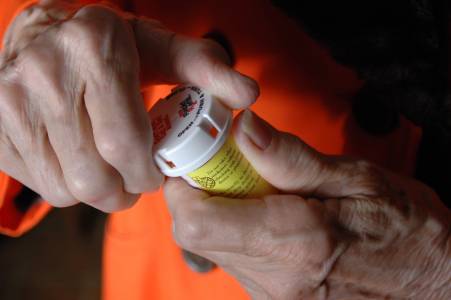Connect with a verified veterinarian in minutes. Licensed vets are available 24/7 to answer your questions. No need to worry about your furry family member.
Do you have medication around your home? If so, then it’s essential to make sure all medications are kept out of your dog’s reach. The reason is that any type of medication, including Arthrotec, could be toxic to your dog if he eats it.
Has your dog eaten Arthrotec? Are you worried the Arthrotec will make your dog sick? If so, you’ve come to the right place. We understand it can be scary when your dog eats something like this.
We’ve put together some information about Arthrotec and whether it can make a dog sick. Let’s get started!
What is Arthrotec?
Arthrotec is a prescription combination medication that contains diclofenac and misoprostol. Diclofenac is an NSAID (nonsteroidal anti-inflammatory drug), which reduces pain and inflammation in the body. Misoprostol reduces stomach acid and replaces protective substances in the stomach that are eliminated by diclofenac.
The combination medication is used to treat osteoarthritis and rheumatoid arthritis in patients who are at risk of developing stomach or intestinal ulcers.
This medication is safe in humans when used correctly; however, what happens if a dog eats Arthrotec?
Arthrotec & Dogs
Unfortunately, Arthrotec is toxic to dogs. When eaten, the medication could lead to severe ulceration of the stomach and intestines. It can also cause kidney failure in dogs.

Review symptoms, medications & behavior to keep your pets healthy with a Vet Online in just minutes.
Ask a Vet Live NowSymptoms of Arthrotec Toxicity in Dogs
You may notice these symptoms if your dog eats Arthrotec:
- Vomiting (may include blood)
- Diarrhea (black tarry stool)
- Lack of appetite
- Lethargy
- Excessive thirst
- General malaise
- Abdominal pain
- Seizure
- Death
If you notice these symptoms in your dog, call the vet immediately. This is a life-threatening emergency. Don’t wait to see if your dog’s symptoms improve or worsen. Head to the vet’s now.
Let the vet know what has happened and about when your dog ate the medication. If possible, take the medication packaging along to the vet’s. The information on the packaging may help the vet.
The vet will work to decontaminate your dog’s system to reduce the amount of medication absorbed by his system. If your fur baby recently ate the medication, the vet may choose to induce vomiting. However, they may also use activated charcoal to get the drug out of your dog’s body.
In most cases, your dog may need to be hospitalized for a few days and require an IV for fluids. The vet may also run tests during your dog’s recovery. Once he’s recovered, your canine companion will finish his recovery at home.
Dogs who receive prompt medical treatment have the best chance of making a complete recovery.
Connect with a verified veterinarian in minutes. Licensed vets are available 24/7 to answer your questions. No need to worry about your furry family member.

Julie
Julie is a graduate of the University of North Carolina, Wilmington, where she studied Animal science. Though contrary to the opinion of her parents she was meant to study pharmacy, but she was in love with animals especially cats. Julie currently works in an animal research institute (NGO) in California and loves spending quality time with her little cat. She has the passion for making research about animals, how they survive, their way of life among others and publishes it. Julie is also happily married with two kids.
Review symptoms, medications & behavior to keep your pets healthy with a Vet Online in just minutes.
Ask a Vet Live Now





